Silence gives way to poems on terror’s trauma from J-K women
In a man’s world of Kashmir — where guns speak louder than words — it was a unique gathering: a meeting of Kashmiri women wr...

In a man’s world of Kashmir — where guns speak louder than words — it was a unique gathering: a meeting of Kashmiri women writers.
And as these women recited their poems and read their prose, it was all about their pain and anger over the last 13 years of turmoil. There were about 30 women — both Muslim and Hindu — and each one of them had some aspect of Kashmir’s tragedy to share.
Although there were some well-known names, it was evident that a majority of the younger participants found a platform for catharsis here.
There was the anguish of a mother waiting for her sons to return home in the evening. There were the days and nights of longing and hope of a ‘‘half-bride, half-widow’’ — a woman whose husband has gone missing. There was blood, tears, hopelessness and pain.
The meet was organised by ATHWAS (Kashmiri for a warm handshake). The group was founded by Kashmiri women, Muslim and Hindu, during a roundtable meeting set up by WISCOMP (Women in Security, Conflict, Management and Peace) – an initiative of Dalai Lama’s New Delhi-based Foundation for Universal Responsibility.
‘‘We were 10 Kashmiri women from across the divide and from different backgrounds who felt that there is an urgent need to create a democratic space for lettered and unlettered expressions to the marginalised voices of Kashmiri women,’’ said Ashima Koul, a founder member of ATHWAS. ‘‘Our aim is to humanise the face of this conflict, provide Kashmiri women an opportunity to discover each other, to help each other cope with grief and trauma.’’
The meet, she said, was aimed to allow younger women writers to have an open discourse with the experienced writers and poets besides providing a platform to share the pain that has been at the epicentre of almost all creative pursuits in Kashmir. So much so that the works no longer weave around the beauty of Kashmir’s lakes and mountains or the stories of romance or heartbreak.
So when Naseem Shifayi, a known Kashmiri poet, read from her recent collection Dare mechrith (Open windows) – it was about a woman’s baaqh (wail).
Bimla Raina, a Kashmiri Pandit poet, recited her Vakhs — a style of poetry introduced by Kashmir’s legendary woman saint Lal Ded who was revered by Muslims and Hindus. Chandrakanta, another Kashmiri Pandit writer, had a story of how Kashmiri women caught up in the conflict, survive its pain and trauma.
Ruksana Jabeen had a poem set in the days of the emergence of militancy in Kashmir. ‘‘This meet is about more than literature. We gather to share pain, forge friendships to make a tiny but significant move to reconciliation,’’ a participant said.



- 01
- 02
- 03
- 04
- 05



























